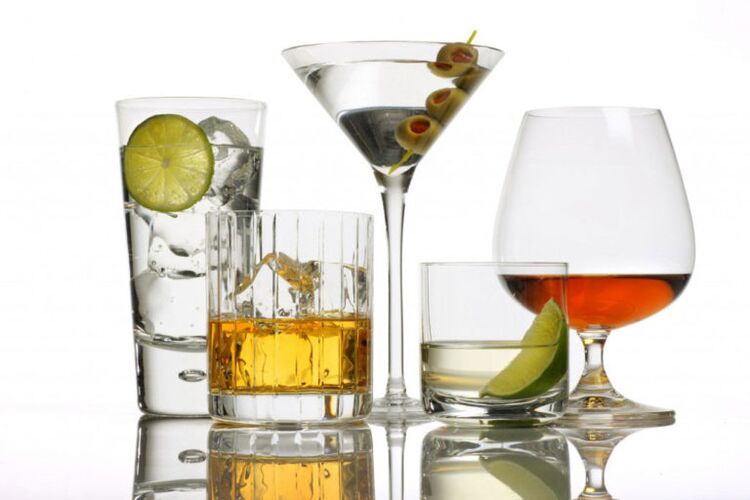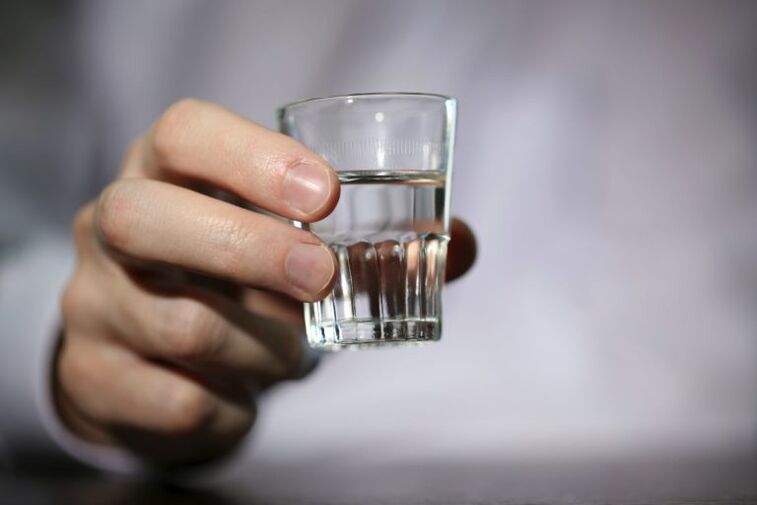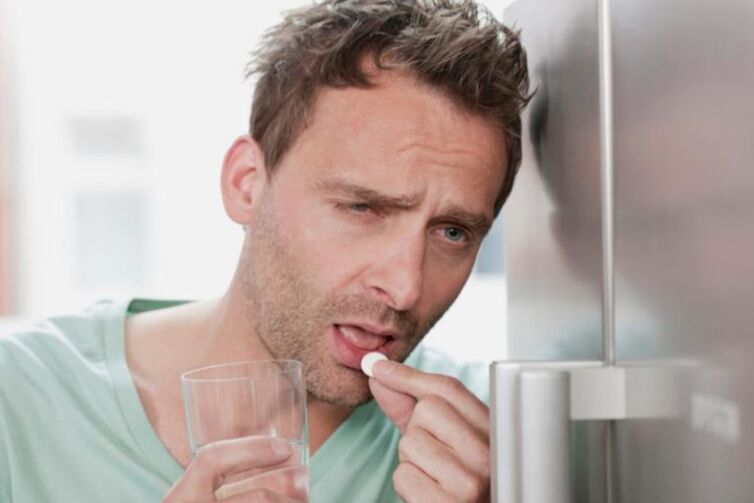Alcoholic beverages are suitable in small quantities. This will be confirmed by any medical staff. Limitations are related to the negative effects of ethanol on organ systems. Many people understand the severity of the problem and are aware of the seriousness of the consequences of alcohol abuse, so they are concerned about how much would be considered acceptable or, conversely, harmless.
Benefits of alcohol
There is an opinion that drinking alcohol in reasonable doses is beneficial to health, so it is not forbidden to drink. Beneficial effects on the circulatory system are most often mentioned. So, ethyl alcohol - the main ingredient in alcoholic beverages - helps dissolve cholesterol plaques that form on the inner walls of blood vessels. Their presence indicates such a disease as atherosclerosis. The disease often develops with a violation of the diet and the use of a large amount of animal fats, which tend to turn into "bad" cholesterol or low-density triglycerides. These compounds clog the artery lumen, impeding the free flow of blood.

Another valuable quality of alcoholic beverages is their ability to relax and relieve stress quickly. Even a small amount of strong drink will lift you up and improve your emotional state. This is due to an increase in happiness and pleasure hormone levels.
Of course, all these precious qualities will be manifested when drinking high-quality wine, so the choice of wine should be considered carefully. Product type also plays a role. So the maximum benefit is dry wine or cognac. These potent drinks contain bioflavonoids, vitamins, and antioxidants.
It turns out that alcohol can actually be beneficial if used wisely. There are many nuances to safe drinking.
Can drink without harm to health
Doctors firmly believe that the negative effects of alcohol on the body cannot be ruled out, but it is realistic to minimize the negative effects. There are several ways, but the best effect is observed with complex use.
- reduce dosage. If a person drinks a lot of alcohol at once, it will inevitably deteriorate health. The safest option is to drink in moderation.
- rare use. People who drink alcohol daily or even twice a week develop chronic diseases related to alcohol abuse. Therefore, it is better to drink as few strong drinks as possible.
- Drink only one drink. The combination of alcohol choices is bad for the nervous system. In addition, in this case, a severe hangover will be inevitable. You should choose for yourself a specific drink and should not mix different drinks.
- Reasonable food choices. You can't drink alcohol and not snack, even if we're talking about light beer. Foods rich in protein and fat will protect the body from too rapid absorption of ethanol into the blood, and at the same time create a barrier that protects the mucous membrane of the digestive tract from alcohol, an aggressor.
By following these simple rules, the negative effects of alcohol on the body are minimized, which will certainly have a positive effect on health.
What affects the determination of a safe dose?

As such, an absolutely safe dose of alcohol does not exist. Alcohol, even in minimal quantities, is harmful to health, so if you can refuse strong drinks, then it is better to use it.
Usually, celebrations and festivals are rarely alcohol-free, so everyone drinks. To protect yourself from irreversible consequences, you need to carefully monitor your alcohol intake and how you feel.
There is no universal number that shows how much you can drink without harming your body. It is necessary to pay attention to the various parameters that affect this:
- sex. Women get drunk faster than men, so their dose should be reduced.
- Weight. The lower the body weight, the faster the state of intoxication will come.
- metabolic rate. It's important that the body processes the alcohol and gets rid of it as quickly as possible. If the metabolism is vigorous, then there should be no problem with neutralizing alcohol. This is an innate trait that cannot be changed.
- liver condition. This gland is primarily responsible for removing all toxins from the body, including alcohol and decay products. If liver tissue is already damaged, alcohol neutralization is slow. And if so, then a person should reduce alcohol consumption.
- Dish. A little more alcohol can be purchased by those who, in addition to drinking, consume protein-rich foods. These are: fish, meat or poultry. Fats, such as vegetable oils, are also helpful.
- Additional training. There are many ways to prepare for an event. Some work so effectively that they allow you to drink more of a slightly stronger beverage. Therefore, it is recommended to take absorbents and preparations with a high content of organic acids two hours before the party.
Based on these parameters, it can be concluded that the safe dose of alcohol will be different for each person. Experts give only average data that needs to be adjusted for themselves.
safe dose of alcohol
A harmless amount of alcohol is one that the body processes quickly and without consequences. To determine it, you must first calculate the toxicity threshold, i. e. the amount of pure ethanol the liver can successfully process. This is 90 grams, if we are talking about a man weighing 70 kg. More than ½ cup of strong alcoholic beverage - vodka or cognac - can be drunk by a stronger sex, weighing about 100 kg.
This is 90 grams, if we are talking about a man weighing 70 kg. More than ½ cup of strong alcoholic beverage - vodka or cognac - can be drunk by a stronger sex, weighing about 100 kg.
It is noteworthy that the threshold for brain toxicity is much lower and is up to 19 grams of pure ethanol, which is equivalent to about 60 ml of vodka. Nerve cells and the connections between them are sensitive structures that, under the influence of negative factors, including ethyl alcohol, begin to collapse. When calculating the safe dose, attention should be paid to the threshold of brain toxicity.
How much can you drink to avoid a hangover?
Most people often ask this question. Citizens are more concerned with how they feel the next day rather than the devastation of their body, which is unnoticeable in the early stages.
Doctors give average data, according to which a person can drink up to 1. 5 ml of pure ethyl alcohol per kilogram of body weight. This number is for men, women should reduce the number slightly.
So, to avoid a hangover, a 70 kg man should stop if he has finished drinking 262 ml of vodka. It is thought that this drink was consumed in a short time and entered the body in almost one serving. If this amount is taken gradually throughout the evening, then the liver, already engaged in work, will be able to neutralize some toxins. In this case, the volume of alcohol can be increased by about a third. These are just digital specs that are common to everyone.
In fact, even a small amount of alcohol can cause acute hangovers and severe hangovers. For this reason, you need to focus primarily on your personal feelings.
Therefore, with severe dizziness, migraine, dark circles under the eyes, irregular heartbeat, you should stop drinking immediately. These are typical signs of taking too much volume. It is better to take measures to cleanse the body from alcohol.
The following are considered effective:
- gastric lavage;
- amount of absorbent;
- take organic acid supplements;
- rich drinks;
- moderate physical activity;
- walk in the fresh air;
- dream.

According to doctors, a feeling of hangover develops when drinking alcohol in reasonable doses. Usually it happens after drinking beer, champagne, cocktails, wine. Strong drinks, taken according to all the rules, rarely cause deterioration of health.
A feeling of hangover occurs after drinking carbonated beverages, since bubbles contribute to instant intoxication by irritation of the mucous membranes and rapid absorption into the bloodstream. Cocktails are dangerous because certain types of alcoholic products are mixed during the manufacturing process, and wines often contain fusel oil, which becomes a major cause of headaches.
Maximum dose of alcohol
Doctors consider not only healthy dosages but also maximum volumes, taking more than this is highly discouraged. This is the amount that the body cannot cope with in a day. As a rule, full recovery takes more than a week.
Doctors consider a maximum volume of 170 grams of pure alcohol per day. This is 538 ml of vodka - a bottle. There will be no serious negative consequences of using such a dosage if a person refuses alcohol for another 8-9 days, but it is better to increase this interval by a month so that the organs can rest andregenerative tissues.
The use of the maximum amount of alcohol leads to a severe hangover, accompanied by symptoms such as:

- headache;
- nausea and vomiting;
- diarrhea;
- full stomach;
- heartburn;
- thirsty;
- halitosis;
- edema;
- shaking hands;
- chills;
- weak.
These are external manifestations that will become apparent the next morning when the ethyl alcohol is processed into the toxic acetaldehyde. In fact, there is a deeper damage to the body.
Consequences of an overdose
Alcohol has adverse effects on all structures, including the heart, brain, liver, and pancreas. With systematic use in a reasonable amount, the cells die, as a result of which the organs stop working properly. As a result, chronic diseases develop, sometimes frustrating throughout life.
The risk of alcohol abuse is even greater than that of developing a dependency. Initially, a person experiences psychological cravings, it seems to him that without alcohol he will not be able to relax and comfortably communicate with others. Such patients do not recognize the addiction itself and believe that they can quit drinking at any time.
When trying to quit, addicts realize that there is a problem. Without ethyl alcohol, the hormonal balance is disturbed, the body reacts with a withdrawal syndrome like a severe hangover. This is a sign of addiction transition to the physical phase. Alcoholics themselves need medical and psychological help. He won't be able to detox on his own.
Furthermore, in the absence of therapeutic measures, the dependence turns to a third, final stage, known as encephalopathy. At this stage, brain cells are globally destroyed, leading to irreversible changes in the human psyche. Being an alcoholic rapidly deteriorates, loses his memory and can no longer boast of intellectual abilities.
The risk of developing an addiction makes it possible to equate alcohol with drugs. This means that the use of alcohol should be handled with care. Rare parties with high-quality alcohol will not cause significant harm and will give the body a chance to recover. If you drink alcohol regularly and in large quantities, health problems are inevitable.

































